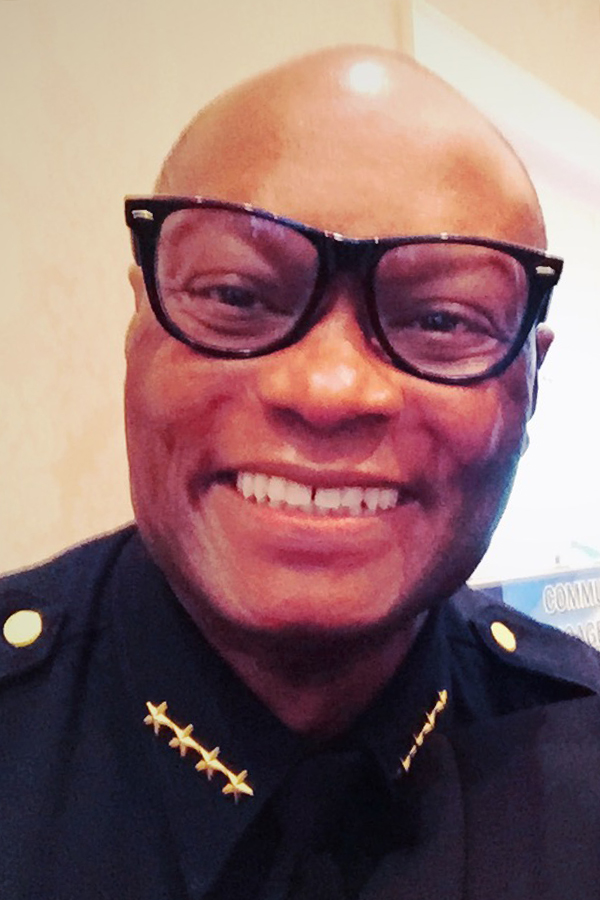When a gunman opened fire on police officers after a Black Lives Matter rally in Dallas, Texas, on July 7, 2016, Dallas Police Chief David Brown became the public face of a grieving department.
“We’re hurting. Our profession is hurting. Dallas officers are hurting. We are heartbroken. There are no words to describe the atrocity that occurred to our city,” Brown said in a press conference the morning after the attack.
The words came from the heart of a man who has experienced great tragedy both personally and professionally and who by all accounts is deeply committed to his Christian faith.
‘Awareness of God’
Brown’s pastor, Tony Evans of Oak Cliff Bible Fellowship, told the Dallas Morning News that Brown brings the same awareness of God to both his personal life and his professional life — a belief that “God has a reason for making things happen — even horrific things,” writes Naomi Martin in her July 9 profile.
Evans said Brown sees himself as a “representative of good fighting evil,” a motivation that has no doubt contributed to his rise to the top law enforcement post in him native city.
Brown has said he grew up fearing police officers but chose to become one because of the crime he saw in his own neighborhood of Oak Cliff.
“First of all, I came into law enforcement in 1983 as a result of the crack cocaine epidemic in my old neighborhood. I grew up in the poor areas of Dallas. I’m an inner city kid. I really appreciate my experiences growing up here,” Brown told CNN anchor Jake Tapper in an interview on July 10, 2016.
‘Personal tragedies’
Brown stuck with police work. He earned a degree from Dallas Baptist University in 1999 and an MBA from Amberton University in 2001, all while rising through the ranks at the Dallas Police Department. In 2010 he was appointed police chief. Those years of advancement were not without tragedy, however.
In 1988 Brown’s former partner was shot and killed while on patrol in a drug-riddled neighborhood. In 1991 Brown’s younger brother, Kelvin, was killed by drug dealers near Phoenix.
And in 2010, just a few weeks after he became chief, Brown’s 27-year-old son killed two men, one a police officer, in Lancaster, Texas, a suburb of Dallas, before being shot to death. David Brown Jr. struggled with mental illness and was under the influence of PCP, according to the coroner’s report.
In May 2010, Brown told the Dallas Morning News that his experiences helped him better understand the toll violence takes on a family.
“I can’t deny that’s a part of who I am,” Brown said. “The families of victims, I know what they go through. My family had to go through that. But does it make me police in a different manner or lead in a different manner? I’m not sure.”
Brown’s personal tragedies and his faith were once again thrust into the spotlight in July 2016 when the gunman killed five police officers and injured several others.
“This city has embraced me as police chief and I’ve always felt a sense of urgency about delivering police service,” Brown told Tapper. “But I never wanted this job to be about me then or now. I’m a servant and at my core I enjoy serving people and I’m a person of faith. I’m a Christian and I believe that service is part of my direction. Loving people despite themselves is something I aspire to be.”
In his years as Chief, Brown has increased the investment of the Dallas PD in youth programs around the city. In 2012 he brought back programs to put officers into schools and devoted full time staffers to administering the programs, according to Dallas Police Lt. Sally Lannom. As a result, programs such as the Police Athletic League, Police Explorer Program, Blue in the School and Unidos, a Spanish language outreach program, have reached thousands of kids in Dallas.
“We have police officers teaching kids throughout the city and interacting with them all the time,” Lannom said. “The kids get to know officers and get comfortable with them because we are allowing them to see us as normal, everyday people.”
In 2015, Dallas PD had 95,000 youth contacts through its various programs, all with the common goal to prevent crimes 10 years down the road, Lannom said.
Brown’s support has been important to the exponential growth of the young programs, Lannom said, as has the support of the Dallas community, including many churches who host programs and other faith-based supporters.
“We make it clear to the students that it’s not just the police officers but the community of Dallas as a whole who is investing in their lives,” Lannom said.
Brown came under fire in early 2016 because of the department’s connections to First Baptist Church, Dallas, and its pastor Robert Jeffress. In April 2016, Jeffress, Brown and other officials announced the beginning of a program that would include counseling for officers and their families, scholarships to send officers’ children to church camps and other support provided by the church. On April 17, the church held a “Back the Blue” event to show support for officers. Brown attended the event and was later criticized because of Jeffress’ past statements on homosexuality and Islam. In response Brown released a blog post in May that clarified “no agreement or relationship between the Dallas PD and First Baptist Dallas to provide services to officers.”
However, in the post, Brown pointed out the importance of the health of officers, including their spiritual health.
“As Chief, one of my greatest worries is the physical and emotional well-being of officers as they put their lives on the line every day to protect the citizens of Dallas,” Brown said in his blog post. “We encourage and support all of our officers who seek out services offered to maintain their physical, emotional and spiritual health regardless of their religious affiliation.” (TAB)






Share with others: